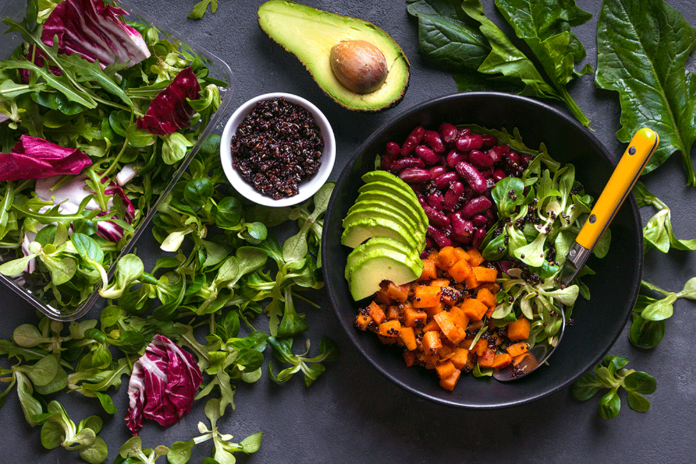5 tips for vegetarians/vegans to ensure you stay healthy
By Rick Hay
Rick is an anti-ageing and fitness nutritionist with many years of clinical experience in nutrition, naturopathy, botanical medicine and iridology.
You can get most of the nutrients you need from eating a varied and balanced vegan and vegetarian diet. For a healthy veg diet, the key is to consume a variety of foods in the right amounts to meet your nutrient needs. Such a diet can provide many health benefits. Vegans tend to have: lower rates of high blood pressure, lower risk of type-2 diabetes, 15% lower risk of cancer, and lower cholesterol levels. Here are a few things you should keep in mind when considering a vegan or vegetarian diet:
Get your vitamin B12
Vitamin B12 is naturally found only in animal products. Vegans and Vegetarians need to choose fortified food products such as nutritional yeast or take a vitamin B12 supplement if they do not consume any animal products. Always check the nutrition label for vitamin B12 in fortified foods.
Protein intake
It is easy to meet your protein needs by eating a variety of plant foods. Sources of protein for vegans include nuts, beans and peas, tofu or tempeh. Vegetarians can also get protein from eggs or dairy foods. Rejuvenation is vegan friendly and has been designed with plant-based proteins and superfoods to support nutritional intake. The key proteins are organic pea, organic brown rice and hemp. The pea and rice proteins are produced using natural sprouting and fermentation processes that release the protein without the need for solvent extraction.
Iron absorption
Vegan sources of iron include tofu, dark leafy greens, seeds, nuts, beans, lentils, and pumpkin. By eating a wide variety of these foods you should be able to meet your daily value for iron. Though, keep in mind that non-heme iron (which includes all the iron in plant foods) is less well absorbed. If you work out a lot (intense workouts) you might want to get your iron levels checked to see if your iron intake is sufficient.
Omega-3
Omega-3 fatty acids are an essential type of “good fat” offering many health benefits such as heart & cardiovascular health or brain health. Seaweed, spirulina, or chlorella are different forms of algae that vegans can eat for their health benefits. Seaweed and algae are important sources of omega-3, especially for people on a vegan diet, as they contain important DHA and EPA. Alternatively, you can opt for a vegan Omega-3 supplement with sufficient amounts of DHA and EPA – there are some very good Algal oils out in the market now so you can humanely bypass the fish.
Stay away from processed vegan meat substitutes
The research found that many meat alternatives were highly processed and full of sodium. They appear to be healthier because marketing pros have been doing their job very well. Feasting on highly processed vegan meat substitutes once in a while shouldn’t be a problem, but try to opt for whole plant foods to meet your day-to-day protein needs.
Rick is an anti-ageing and fitness nutritionist with many years of clinical experience in nutrition, naturopathy, botanical medicine and iridology.



















![[CLOSED]December Mega Book Giveaways](https://lifestyleqld.com.au/files/wp-content/uploads/2017/11/books-265x198.jpg)









